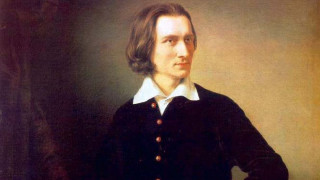
Although Franz Liszt is an oft "quoted” composer, he has still not received the place in history he deserves. He is frequently researched, studied, and analyzed. However, Liszt is not only an exceptional piano virtuoso and outstanding composer of the Romantic period, but is one of the greatest geniuses of the 19th century. He was a visionary and progressive musical innovator who not only inspired his brilliant son-in-law Richard Wagner, but also anticipated 20th century “modernism” and minimalism in his meditative works. His enormous oeuvre of hundreds of works contains symphonies, symphonic poems, oratories, masses, concertos, and even solo pieces. Liszt even composed operas (the first when he was only a child of thirteen), but then gallantly allowed his more experienced contemporaries to work in the genre.
Liszt was a man of tumultuous past, manically adored as a young man and always remaining a crowd favourite. His deep faith was apparent in the creative work he undertook to reform sacred music, and later, as a member of the Third Order of St. Francis, this faith also showed in his lifestyle, unconditional love for others, and altruism. In addition to his famous contemporaries, the widely learned composer has since inspired many writers and poets to take up the pen. Liszt’s commitment to the Church and, first and foremost, his Christ-centric approach are shown in monumental spiritual and liturgical works such as The Legend of St. Elizabeth, the Christus oratorio, the Esztergom Mass and the Coronation Mass, the Missa Choralis, and the Requiem. He spent the latter part of his life working in Budapest, Weimar, and Rome as an artist, teacher, and conductor. Liszt died in Bayreuth and, although he requested to be laid to rest in the Franciscan Church in Pest in a Franciscan habit, he received a mausoleum over his crypt in Wagner’s city. In terms of classical music, alongside Béla Bartók Franz Liszt is the most performed Hungarian composer in the world.